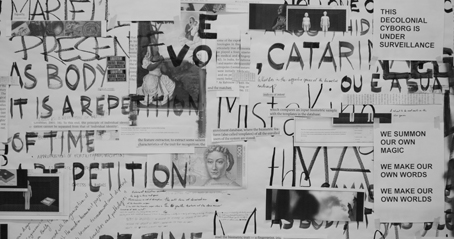A TOPOGRAPHY OF EXCESSES: INTERSECTIONAL SPACES IN ART
- Start Page
- Calendar
- A TOPOGRAPHY OF EXCESSES: INTERSECTIONAL SPACES IN ART

Welcome to an evening of presentations and discussions with artist and designer Luiza Prado with guests artist and researcher Ece Canli and designer Nedine Kachornnamsong.
“A Topography of Excesses” is a body of work initiated by artist Luiza Prado spanning installation, performance, and writing that examines the notion of ‘excess’ as a space for decolonial resistance. The project starts from a rejection of Western bodily topographies and its taxonomical technologies, designed to maintain bodies marked by colonizing processes in positions of subalternity, simultaneously coding them as excessive — too numerous, too sensual, too fertile, too emotional, too loud, too ambiguous — and as falling short of a hegemonic notion of ‘human.’
Within the disciplinary logic of coloniality, the excesses of these bodies must be contained; cages must be erected to restrain their subversive potential. These may take different forms: from birth control initiatives specifically targeted at minority populations, to menstrual products designed to enact an imperialist feminist project, to abortion policies aimed at restraining the sexual and bodily agency of colonized subjects.
Yet, it is also in the marginal space of excess that emancipatory practices emerge, and that bodies may reject definitions established by colonizing processes. These become spaces of intersectional solidarity; spaces where struggle can be shared, where plural worlds can be enunciated, and new practices can emerge. “A Topography of Excesses” investigates the potentials of reveling in excess, of rejecting colonial sexual politics in favor of emancipatory, decolonial practices.
As part of this project, Luiza Prado invites artist and researcher Ece Canli and designer Nedine Kachornnamsong for a discussion on the different, intersectional facets of excess, and on what kinds of practices may emerge from it.
Ece Canlı is a researcher, performance artist and musician, born in Turkey, currently based in Portugal. She holds a MFA from Konstfack University College of Arts, Crafts and Design (Sweden) and Ph.D. in Faculty of Fine Arts from University of Porto (Portugal). Her work investigates the relationship between material practices and body politics from a decolonial queer feminist viewpoint, with particular focus on sartorial, discursive and spatial practices and their roles in reproducing privileged and oppressed bodies. She frequently collaborates with other academicians, artists, musicians and activists, by using artefacts, texts, voice and sound as her main tools.
Nedine Kachornnamsong is a designer and researcher born in Bangkok in 1980. She obtained an MFA from Valand Academy, Sweden and M.Sc. in IT-Product Design from the University of Southern Denmark. By focusing primarily on a mode of production and an act of activism, her work investigates the synergic effect of technology and its capacity of placemaking. She currently works for Women on Web, a non-profit organisation providing telemedical abortion to anyone who lives in countries where safe options are inaccessible.
Luiza Prado de O. Martins is an artist and researcher born in Rio de Janeiro in 1985, four hundred and eighty-five years after the Portuguese first invaded the land currently known as Brazil. She holds an MA from the Hochschule für Künste Bremen and a PhD from the Berlin University of the Arts. Her work investigates the ways in which colonial gender difference is inscribed and imposed upon and within bodies through technology; over the past four years, she has been researching practices of birth control through performance, video, and installation.

